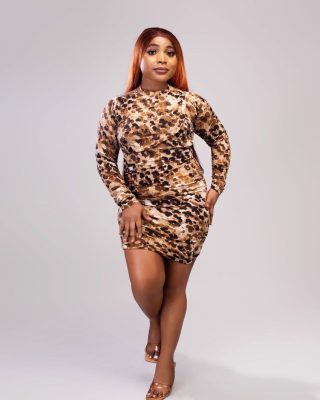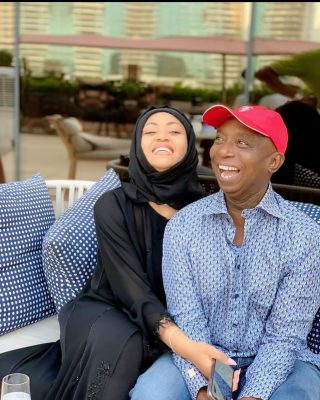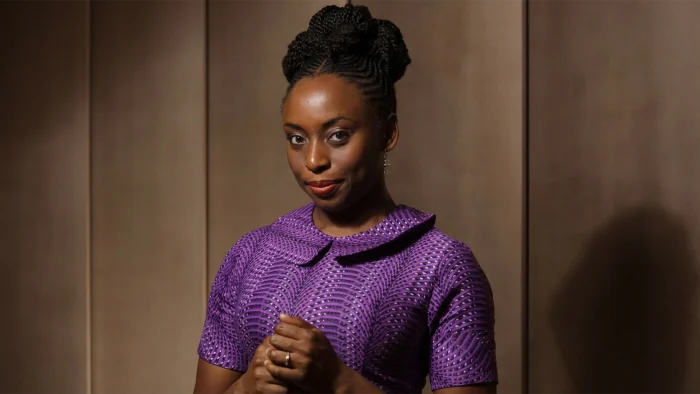There is always a moment in a designer’s timeline where denim stops being “weekend fabric” and starts being language. With Ranto Clothings’ Denim Vogue Collection 2024, Creative Director Bright Urhobo takes that step. He doesn’t treat denim as nostalgia or utility. He treats it as attitude, body politics, and modern femininity.
This look, a strapless, fitted, mini-length denim dress, is deceptively simple but actually quite strategic.
At first glance, you think: classic bustier top, flirty skirt, but the engineering is smarter than that.
The bodice is cleanly sculpted around the bust and upper torso, with visible seaming that hints at corsetry without the aggression of full corsetry. The neckline curves in a soft wave rather than a hard straight cut. That curve matters. It stops the piece from feeling like a denim tube and instead gives it a romantic line across the chest, that a touch of softness on a famously rigid fabric.
The waist is defined firmly, but not brutally. We’re not looking at a “snatched” Instagram shape; we’re looking at tailored containment. The seaming through the waist and the presence of belt loops introduce the visual language of denim jeans, almost like the ghost of a waistband, but then it dissolves into dress form. That detail is subtle and smart: Urhobo is playing with familiar codes (belt loops, jean seams, topstitch structure) but he’s not letting the garment collapse into casualwear. This is not DIY cut-up denim.
Below that, the skirt opens into a short A-line with structured pleats. The flare is measured. It’s not ruffled or tiered; it has volume controlled by construction, not by excess fabric. The skirt length is unapologetically short, which gives leg, yes, but also gives stride. You can actually walk in this dress. You can dance in this dress. You can sit on a barstool without feeling like the garment is fighting you.
And that practicality is worth noting. Womenswear today is obsessed with performance vocabulary like “workwear,” “active tailoring,” “multi-wear.” But here the performance is quiet. The dress is wearable because the shape respects movement. That is design maturity.

Let’s talk about the denim itself. This isn’t heavy, armored, menswear denim. This is a softened, mid-wash, likely cotton-spandex blend denim with enough give to follow the body without gaping and enough structure to hold the princess seams and pleats. The wash sits in that very flattering in-between space, not stark, not acid, not distressed. It feels like the sun touched it. Lived in, but not destroyed.
That choice is deliberate. A harsher wash would have pushed the dress toward clubwear. A darker indigo would have made it feel more winter, more night, more “serious.” This light, balanced wash keeps it youthful and most importantly: approachable. It looks like something you could throw on instinctively and still look like you meant it.
There is something quietly political about this dress that should not be ignored. This is not cut only for a single, narrow fantasy body. The model’s figure is allowed fullness in the bust, the upper arm, the thigh. The dress doesn’t punish her for that. It accommodates.
Too often, denim mini dresses are built like denial: squeezed bust, hard top seam cutting into the skin, skirt riding up, hem threatening to split. Here, we see ease. We see confidence. We see a designer who understands that curves are not a design challenge.
And that matters for the brand. It announces who Ranto Clothings thinks “fashion” is for.
Urhobo treats denim not as a symbol of grit or anti-luxury, but as a legitimate fabric for femininity. There is no apology in it. There is no “I’m dressing down, but with heels.” No. The dress is the outfit.
That’s the confidence of the Denim Vogue Collection as a whole: it argues that denim belongs in main-character dressing, not supporting role.
From a commercial perspective, this is an extremely smart piece. It lives in that sweet zone between day and night, between casual and sexy, between “wear it out” and “wear it again next weekend.” A teenager could wear it. A 30-something could wear it. It can sit with sneakers at 2 pm or with a tiny bag and a heeled mule at 9 pm
And importantly, it feels like Ranto Clothings. This is how brands are built: not by one dramatic runway gown that nobody can buy, but by a piece women will actually live in, be photographed in, tag publicly, and allow to circulate culturally.
Bright Urhobo, through this look, makes a simple but important promise: he will not treat women’s bodies as trends. He will cut for them. He will build around them. He will let denim, that most democratic of fabrics, act like a custom language.
The Denim Vogue Collection 2024 is not just selling denim. It’s selling freedom of wear.








